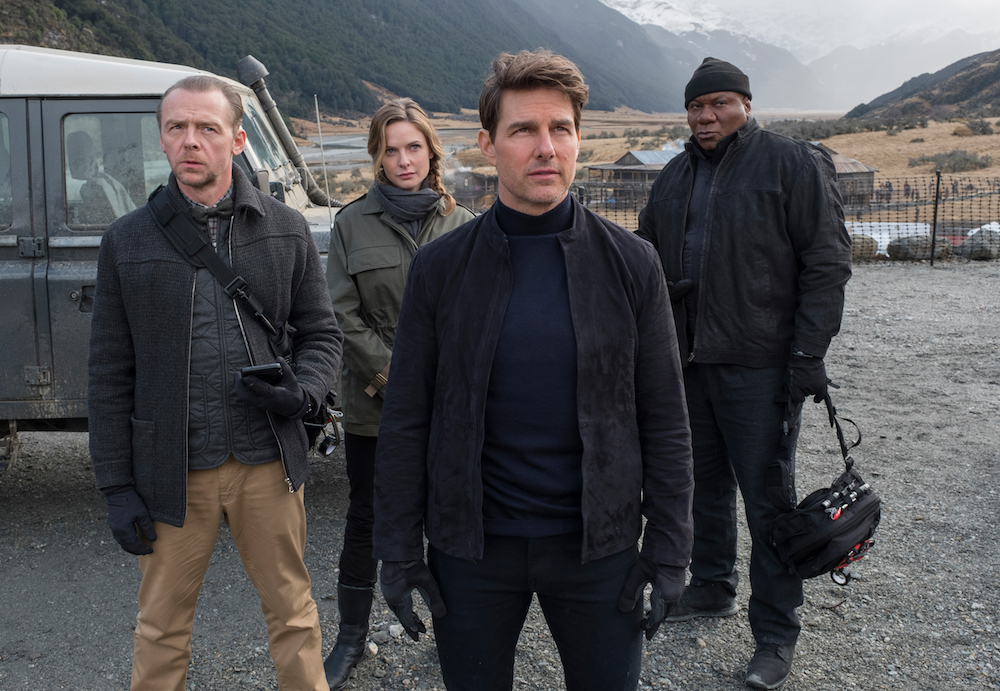Christopher McQuarrie’s “Mission: Impossible – Fallout” is the latest entry in the “M:I” franchise and the first to repeat directors. Considering how good the fifth movie in the series was, it made all the sense in the world for producer and daredevil Tom Cruise to bring him back. Still, I don’t believe a film can be judged solely on the bravery of its star, or even on the impact of McQuarrie’s action sequences. McQuarrie, oddly enough, has now made both the best and the worst “Mission: Impossible” movies to date.
Everyone seems to agree that the best thing about “Fallout” are the action sequences, but they only bring up memories of previous films: There’s the HALO jump that echoes “Tomorrow Never Dies”; the brutal bathroom fight from “True Lies”; the watery escape by the villain from “License to Kill”; the rooftop chase (Cruise runs and runs at full speed but still can’t seem to catch a walking Henry Cavill) from just about every recent action movie in memory; the concluding fight on the mountains from “Cliffhanger.” Even Ethan Hunt going full speed in a motorcycle through Paris feels like it’s from every movie Cruise has made.

Still, there’s no denying that “Fallout” takes each and every one one of these scenes to the next level. It seems like with every new “M:I” movie, Cruise is doing more and more dangerous action sequences without the benefit of a stuntman. There’s a sequence near the end of the latest entry where he falls off a helicopter on top of a net that is so astounding, the whole of audience at the screening gasped. The very same applied to the earlier scene where he jumps from one building to another. I don’t think anybody would be shocked if one of these days he were to leave a future one incomplete.
But for the first time with the “M:I” series, “Fallout” gave me the feeling throughout that the writers first came up with the stunt sequences and then wrote a plot around them. Case in point: was it really necessary for Ethan Hunt to take a High Altitude Low Opening jump in order to infiltrate a crowded night club … in Paris?!?! I would think that a jump like that would be needed in order to sneak into North Korea, Afghanistan, or what have you, but Paris? I can’t see how a commercial flight and a Uber wouldn’t have accomplished the same trick. And how about McQuarrie relying on the old “detonating device with large digital numbers countdown” for suspense during the film’s climax? Were any audience members really shocked when it didn’t go off at the very last second?
Another aspect that really struck me about “Fallout” was just how unrealistically it dealt with repercussions in its fight scenes. The bathroom fight, for example: One person lands backwards on the frame of a smashed mirror, is later pushed straight through a column, and yet has no trouble getting up right away. There’s also a sequence at the end where Ilsa Faust (Rebecca Ferguson) gets hit with a log in the face off-camera, and based on the sound from the impact I imagined she had surely been disfigured for life. But when she came back on screen she had only suffered a small scratch above an eyebrow.

Still, the biggest problem for me had to do with the rest of the supporting characters. One of the best things about “Mission: Impossible – Rogue Nation” was the terrific CIA chief character Alan Huntley, as played by Alec Baldwin. He was a true bastard who turned out to be too smart not to turn to the IMF’s side (and become Ethan’s best boss so far), and he had just the right incentives. Here, he simply plays a nice guy who is unceremoniously killed midway through the film, long before his passing could earn any real weight. Then there’s Angela Bassett’s Erica Sloan character, who is first duped into bringing down Ethan, and then rescues him, without making it clear what caused her change of heart. Every “Mission: Impossible” movie by nature has its share of twists and turns, but those in “Fallout” are reduced to characters simply changing loyalties. This is a far cry from the fifth “M:I” entry which had some great twists, no matter how outrageous (think of Ethan memorizing the whole of the Syndicate’s directory and in the process becoming someone the villain just can’t kill!).
Another “Fallout” misfire concerns how the filmmakers deal with an unnecessary love triangle, which drags the movie into two-and-a-half-hour territory. In “Mission: Impossible III,” Ethan married Julia (Michelle Monaghan). The next two movies did their best to ignore her existence, going as far as creating the spontaneous romantic tension between Ethan and Ilsa in the fifth movie, at which point I had pretty much forgotten that the Cruise character was even married. Now, a good deal of “Fallout” is spent trying to justify why Ethan and Ilsa should end up together by showing just how unbelievably a happy and fulfilling life Julia has been living with another guy.
This scene actually reminded me of the second “Austin Powers” movie, when the Mike Myers character discovers that his new wife Vanessa is a robot, destroys her and then realizes he can now go back to enjoying the pleasures of single life. At the end of the day, I suppose the filmmakers painted themselves into a corner by giving Ethan a wife, and were never really able to figure out what to do with her. What’s worse is that McQuarrie is making the same mistake all over again with Ilsa, who’s just not quite as fascinating here as she was in the fifth “Mission: Impossible.”

It’s amazing to me that Cruise is just about as old as Roger Moore when he did “A View to a Kill,” a James Bond movie where it felt as if Moore needed stunt doubles for such things as walking up a flight of stairs. Everyone seemed to agree he was way too old to be playing an action hero and wooing girls half his age (if that!). Meanwhile, “Fallout” has Cruise running halfway across London without ever losing his breath in the slightest. I have my doubts as to how long Cruise will be able to keep this up in his sixties. But there’s no denying that in an industry that craves youth he has been able to make his age irrelevant, which is no small achievement for sure.












